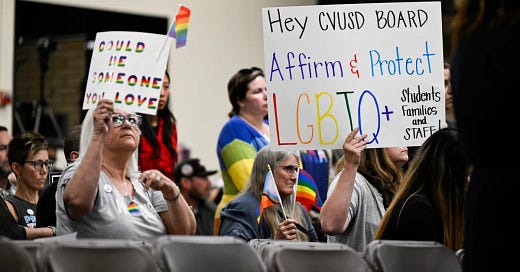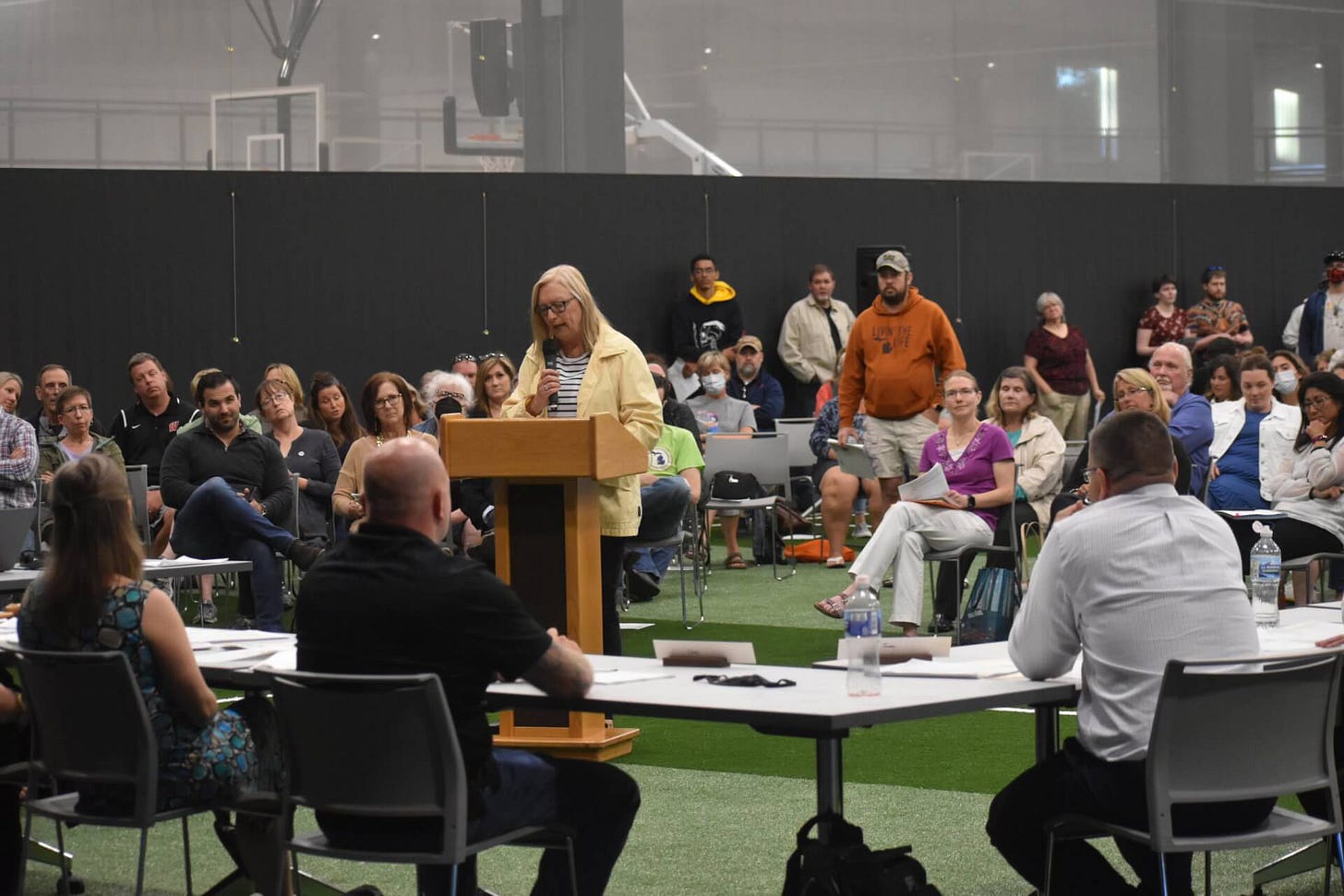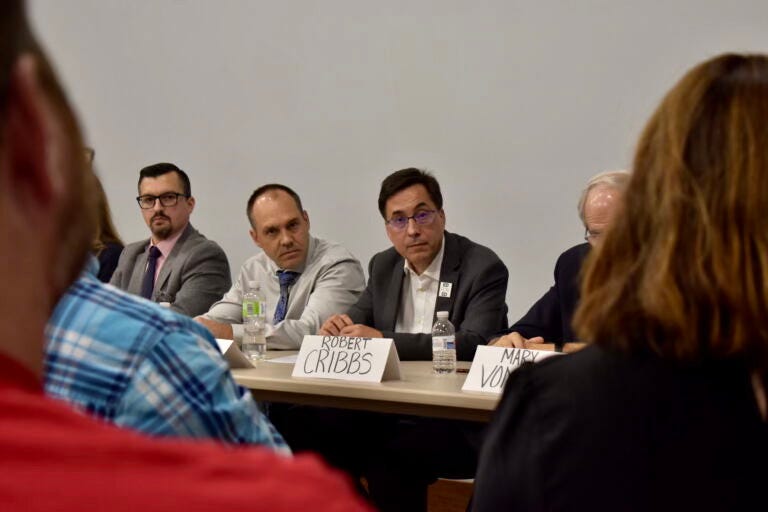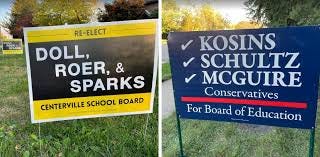By Karin Chenoweth, founder of Democracy and Education.
Everyone reading this knows that American democracy is in a pretty bad way.
So what can we do? There’s a lot to do at the national level, but we are not just a nation. We are a collection of hamlets, towns, cities, counties, and states.
No matter where we live, we all live in a school district. And our school districts need our help.
To begin with, the right has stepped up its long-standing focus on taking over school boards. In 2021 Steve Bannon said, “the road to Congress is through the school boards.” Since then, many organizations have formed to recruit, train, and support school board candidates. Most of them are funded by dark-money billionaires. You’ve probably heard about Moms for Liberty but there are many, many others. The Leadership Institute, which has been training right-wing candidates for years, began training school board candidates in 2022, and their candidates have been running ever since—possibly in your district.
The right takes advantage of the fact that as a nation we have pretty much ignored school boards. Collectively we think they are doing boring work. And, of course, some of what they do is boring, just as any governance is.
But at bottom they are our first line of defense. They can work to ensure that all children in the school district get a great education--or they can undermine that very idea. They can ensure that a child’s race, economic status, or disability is not an impediment to opportunity--or they can create endless obstacles for children and their families.
We have more school board members—something around 88,000—than any other kind of politician. They are the elected officials that ordinary citizens are most likely to know and see at the grocery store. They are the ones who not only set the tone for how we treat each other as fellow citizens, but who also set a vision for what we want for the children of our community. And, not inconsequentially, they provide a political springboard for other offices.
Yet shocking numbers of school board elections are uncontested—some even go without any candidate at all, leaving it to school boards themselves to pick their members.
This political neglect is partly responsible for the fact that there are hundreds—maybe thousands (it’s hard to keep track)—of school board members who distract their constituents with book bans and transgender bathroom controversies while they loot budgets by giving jobs and contracts to cronies, buying explicitly religious and right-wing curricula, and supporting efforts to fully privatize public education.
In other words, we are in a desperate struggle over the fate of our public schools and our democracy, and need all the grassroots energy we can muster.
If you get involved in your local school board, here are a few things to remember.
Most school board races are non-partisan. Although candidates may be registered as one party or another—or as an independent—the office itself is, in most states, non-partisan, which means candidates do not have a D or R next to their name on the ballot. So school board candidates can’t rely on voters who just vote their party’s candidates, which in turn means they have a major communications challenge. Grassroots folks can help get out the word on which candidates support public education and oppose book banning.
Most local Republican parties are fully mobilized to help even the most extreme candidates while, for the most part, local Democratic parties do not get involved in school board races because they are non-partisan. This means that sensible, non-extremist candidates are at a real organizational disadvantage. Again, grassroots help can be critical in organizing volunteers, holding meet-and-greets, and all the other basic kinds of campaign activities.
Although school board races are still not the money pits of other races, extremist organizations are pouring money into some races, which means pro-public education candidates need to raise the kind of money they never needed in the past. As one successful candidate said wryly, “I had to spend $100,000 to win a volunteer job.” The money is needed for signs, web sites, digital ads, mailers, and programs to help them identify the doors to knock. (Most local Democratic Parties are not letting them use MiniVan, and most couldn’t afford it anyway). You see where I’m going with this, right? They need help from the grassroots to raise money.
Even if your school district is not in immediate danger from an extremist candidate, it still likely suffers from political neglect and is thus vulnerable. We need folks going to school board meetings to keep tabs on what issues are bubbling up. We need folks paying attention to what extremists are saying about the schools. We need folks reporting on what really is going on in the schools (local newspapers are dying and we need other ways for people to find out accurate information). We need folks to ensure their school boards are protecting children’s right to learn honest history and read books.
In other words, we need grassroots energy where it can have a huge effect—at the school board level.
Find out who is serving on your school board and who is thinking of running. See when the election is—we’ve got elections coming up this year, for example, in Illinois, Wisconsin, and Virginia, but there are elections for school board every year. See if you can organize support for an existing candidate. If there is time to file, think about who you can recruit—and remembr that it might be you. (We have a lot of information about how to file and how to run on the Democracy and Education web site.)
It isn’t always easy to figure out who is an extremist and who is committed to public education and democracy. The extremists have gotten very savvy and often hide their agendas. One tip is to look for the seal of the School Board Integrity Project or Stop Moms for Liberty. Their candidates are vetted and pledge to uphold the non-partisan values of excellence, respect, compassion, trust, and belonging.
You can also join Stop Moms for Liberty, which has state chapters all across the country. Defense of Democracy organizes people to attend their school board meetings, also all over the country.
All of these national organizations, including Democracy and Education, are relatively new and working on shoestring budgets. But there are other organizations at the state level, for example in Indiana and Virginia. And sometimes the local teachers’ unions have identified school board candidates who will support teachers and oppose book bans.
Look around—there is a great need for grassroots energy at every level.
A word of caution: If a sensible candidate is running against an extremist, please don’t organize for someone who will split the pro-public school vote. When voters understand the issues and the stakes, they almost always vote for pro-public school candidates against the anti-public education extremists. But when there are two or more good-governance candidates running, that allows extremists to slip in. If there are two great candidates, urge one to bide their time a bit by working in the campaign. There is sure to be another opening at some point.
The short story is that school board races are enormously important, but they aren’t like other races. They are smaller and more easily influenced by small amounts of money and organizing.
So don’t let the bad guys be the only side influencing.
And if you do get involved at the school board level, join Democracy and Education! We’re here to support you with lots of information and a vibrant, active community.
___________
Karin Chenoweth is founder of Democracy and Education. It welcomes school board members, former members, candidates, and folks working in school board campaigns.
Photos by Allison R. Donohue, courtesy of the Michigan Advance
READ MORE - Check out our Oct 1, 2024 article "Why We Write for School Board Races: Pro-democracy and Democratic school board candidates are battling Moms For Liberty. The grassroots has their backs.”







I'd like to offer up a resource. Staying healthy is important for us to be able to pursue our goals.
I write about health. My most recent post is about dealing with stress. Reading and subscriptions are free. https://longcovidjourney2wellness.substack.com/p/finding-anchors-in-the-face-of-stress